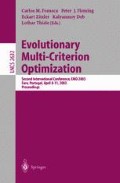Abstract
The trade-off between obtaining a good distribution of Pareto-optimal solutions and obtaining them in a small computational time is an important issue in evolutionary multi-objective optimization (EMO). It has been well established in the EMO literature that although SPEA produces a better distribution compared to NSGA-II, the computational time needed to run SPEA is much larger. In this paper, we suggest a clustered NSGA-II which uses an identical clustering technique to that used in SPEA for obtaining a better distribution. Moreover, we propose a steady-state MOEA based on ε-dominance concept and effcient parent and archive update strategies. Based on a comparative study on a number of two and three objective test problems, it is observed that the steady-state MOEA achieves a comparable distribution to the clustered NSGA-II with a much less computational time.
Access this chapter
Tax calculation will be finalised at checkout
Purchases are for personal use only
Preview
Unable to display preview. Download preview PDF.
References
K. Deb. Multi-objective optimization using evolutionary algorithms. Chichester, UK: Wiley, 2001.
K. Deb, S. Agrawal, A. Pratap, and T. Meyarivan. A fast and elitist multi-objective genetic algorithm: NSGA-II. IEEE Transactions on Evolutionary Computation, 6(2):182–197, 2002.
K. Deb and S. Jain. Running performance metrics for evolutionary multi-objective optimization. In Simulated Evolution and Learning (SEAL-02), in press.
K. Deb, L. Thiele, M. Laumanns, and E. Zitzler. Scalable multi-objective optimization test problems. In Proceedings of the Congress on Evolutionary Computation (CEC-2002), pages 825–830, 2002.
A. Farhang-Mehr and S. Azarm. Diversity assessment of pareto-optimal solution sets: An entropy approach. In Proceedings of the World Congress on Computational Intelligence, pages 723–728, 2002.
M. P. Hansen and A. Jaskiewicz. Evaluating the quality of approximations to the non-dominated set. Technical Report IMM-REP-1998-7, Lyngby: Institute of Mathematical Modelling, Technical University of Denmark, 1998.
Joshua D. Knowles and David W. Corne. Approximating the non-dominated front using the Pareto archived evolution strategy. Evolutionary Computation Journal, 8(2):149–172, 2000.
M. Laumanns, L. Thiele, K. Deb, and Eckart Zitzler. Combining convergence and diversity in evolutionary multi-objective optimization. Evolutionary Computation, 10(3):263–282, 2002.
J. R. Schott. Fault tolerant design using single and multi-criteria genetic algorithms. Master’s thesis, Boston, MA: Department of Aeronautics and Astronautics, Massachusetts Institute of Technology, 1995.
N. Srinivas and K. Deb. Multi-objective function optimization using non-dominated sorting genetic algorithms. Evolutionary Computation Journal, 2(3):221–248, 1994.
E. Zitzler and L. Thiele. Multiobjective evolutionary algorithms: A comparative case study and the strength pareto approach. IEEE Transactions on Evolutionary Computation, 3(4):257–271, 1999.
Author information
Authors and Affiliations
Editor information
Editors and Affiliations
Rights and permissions
Copyright information
© 2003 Springer-Verlag Berlin Heidelberg
About this paper
Cite this paper
Deb, K., Mohan, M., Mishra, S. (2003). Towards a Quick Computation of Well-Spread Pareto-Optimal Solutions. In: Fonseca, C.M., Fleming, P.J., Zitzler, E., Thiele, L., Deb, K. (eds) Evolutionary Multi-Criterion Optimization. EMO 2003. Lecture Notes in Computer Science, vol 2632. Springer, Berlin, Heidelberg. https://doi.org/10.1007/3-540-36970-8_16
Download citation
DOI: https://doi.org/10.1007/3-540-36970-8_16
Published:
Publisher Name: Springer, Berlin, Heidelberg
Print ISBN: 978-3-540-01869-8
Online ISBN: 978-3-540-36970-7
eBook Packages: Springer Book Archive

